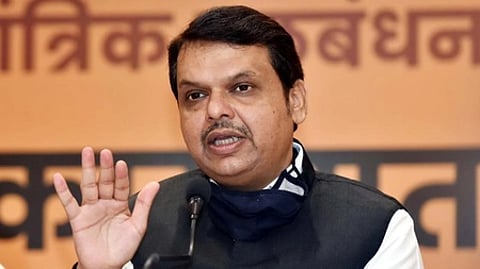

MUMBAI: From an obscure corporator to becoming the youngest mayor of Nagpur, to the first BJP chief minister of Maharashtra, Devendra Fadnavis' climb up the political ladder has been steady, as he looks all set to occupy the state's top post for the third time.
In a state dominated by Maratha politics and politicians, the 54-year-old leader, with deep roots in RSS, is only the second Brahmin after BJP's estranged ally Shiv Sena's Manohar Joshi to become the state's chief minister.
Ahead of the 2014 assembly polls, the soft-spoken and portly leader was a clear favourite for the coveted post, largely due to the confidence he enjoyed of both Prime Minister Narendra Modi and senior BJP leader Amit Shah.
"Devendra is Nagpur's gift to the country," Modi had said of him at an election rally.
Though Modi had launched a campaign blitzkrieg in the 2014 Lok Sabha and Maharashtra assembly polls, a portion of the credit also went to Fadnavis, then state BJP president, for the party's unprecedented victories in the elections.
Son of Jan Sangh and later BJP leader late Gangadhar Fadnavis, whom his fellow Nagpur politician and former party chief Nitin Gadkari calls his "political guru", Devendra cut his teeth in politics at a young age when he joined Akhil Bhartiya Vidyarthi Parishad, the students wing of RSS, in 1989.
At 22, he became a corporator in the Nagpur civic body and its youngest Mayor in 1997 at the age of 27.
Fadnavis contested his first assembly election in 1999 and won. There was no looking back for him as he won three subsequent assembly elections. He currently represents Nagpur South West seat in the House.
Unlike many leaders across the political spectrum in Maharashtra, Fadnavis has remained untainted by accusations of corruption.
Among the most articulate Maharashtra politicians, Fadnavis is also credited with pushing the previous Congress-NCP government into a corner over the alleged irrigation scam.
Fadnavis experienced a setback in the aftermath of the 2019 assembly elections as the then united Shiv Sena leader Uddhav Thackeray pulled out of the pre-poll alliance over sharing of CM's post, shattering the BJP leader's much-hyped mee punha yein (I will come back again) slogan.
Fadnavis was sworn in as the chief minister for the second time on November 23, 2019 and Ajit Pawar was sworn in as the deputy chief minister.
However, before a Supreme Court-ordered no-confidence motion could take place, Fadnavis quit on November 26, three days after taking oath as the CM.
Uddhav Thackeray, propped up by Sharad Pawar-led NCP, later became the CM but quit after senior Sena leader Eknath Shinde split the party and later became the CM.
After Thackeray demitted office following the large-scale desertions in the Sena, many political observers thought that Fadnavis, who they knew was behind the episode, would become the CM.
However, the BJP leadership had other plans and a reluctant Fadnavis was asked to occupy the deputy CM's post.
His tenure in the last two-and-a-half years as Deputy Chief Minister has seen a marked resurgence, and Saturday's results come as the much-awaited cherry on the cake.
Though he hails from a politically active family, his father and aunt both served in the Maharashtra Legislative Council, Fadnavis has crafted his own distinct political identity.
Fadnavis' first tenure as the CM was characterised by a combination of good governance and effective political manoeuvring.
He earned praise for his push to expedite infrastructure projects, gaining favour particularly among urban voters. However, his term was not without challenges.
The state suffered significant crop losses due to erratic weather, and his initial rejection of loan waivers for affected farmers sparked widespread protests.
Another major issue during his tenure was the Maratha community's demand for reservations in education and government jobs.
Though he passed legislation to meet these demands, the subsequent Supreme Court ruling that overturned the law left many in the Maratha community dissatisfied, blaming Fadnavis for the failure.
The 2019 assembly elections marked a dramatic shift in Fadnavis' political trajectory.
The Shiv Sena's refusal to join the government unless it shared the Chief Minister's post led Fadnavis to seek an alternative alliance with the Nationalist Congress Party (NCP) leader Ajit Pawar.
This government, however, was short-lived, collapsing after just 72 hours.
Fadnavis then assumed the role of Leader of the Opposition in the state assembly.
In June 2022, following a rebellion within the Shiv Sena led by Eknath Shinde, Fadnavis was instructed by the BJP leadership to return to the government as Deputy CM under Shinde.
Although initially reluctant, Fadnavis accepted the role, signalling his loyalty to the party leadership.
Even after a significant loss in the 2024 Lok Sabha elections, he played a pivotal role in shaping the seat-sharing arrangement between the BJP and Shinde's faction.
Saturday's results of the state assembly polls, which are overwhelmingly in the BJP's favour, will determine the next phase of Fadnavis' career, which has thus far been defined by resilience, adaptability, and strategic insight.
In the ever-evolving political environment, Fadnavis' ability to adapt and make tactical decisions could prove crucial for him and his party.